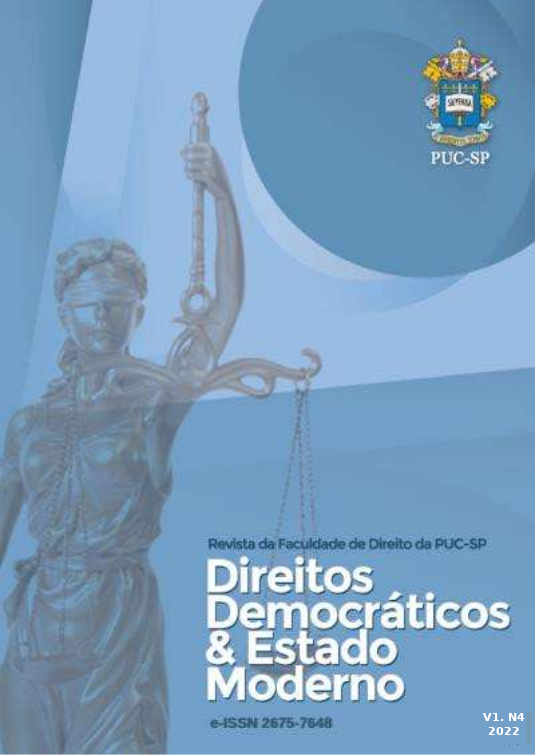A Interseção entre a filosofia política de Thomas Hobbes e a física de Isaac Newton refletida na teoria do Estado
DOI:
https://doi.org/10.23925/ddem.v1.n.4.54138Palavras-chave:
Thomas Hobbes, Leviatã, Leis de Isaac Newton, Teoria Geral do EstadoResumo
Objetivo: o presente artigo científico tem como finalidade abordar os pontos de interseção existentes entre os pensamentos de Thomas Hobbes contidos na sua obra intitulada Leviatã e as teorias da dinâmica física de Isaac Newton, que estudam o fenômeno do movimento, inseridos no contexto da Teoria Geral do Estado. Metodologia: a metodologia de pesquisa é jurídico-teórica, por meio do raciocínio empírico-dedutivo e da observação da realidade social, em uma abordagem bibliográfica e documental, por meio de revisão de obras, artigos científicos, o ordenamento jurídico e a jurisprudência. Resultados: os resultados obtidos referem-se à existência de pontos em comum entre as teorias relacionados à Teoria Geral do Estado. Contribuições: a contribuição científica almejada é, precipuamente, fomentar o debate, bem como demonstrar a interdisciplinaridade entre os ramos científicos, mediante um novo olhar sobre a Teoria Geral do Estado.
Referências
ALEXY, R. Theorie der Grundrechte. Baden-Baden: Nomos, 1985.
ARRUDA ALVIM, E. Direito processual civil. 5a ed. São Paulo: Revista dos Tribunais, 2013.
ARRUDA ALVIM, M. Manual de direito processual civil. 17a ed. São Paulo: Revista dos Tribunais, 2017.
ARRUDA ALVIM, T. Noções introdutórias – Tensão entre estabilidade e evolução – O que cabe à lei? O que cabe à jurisprudência – Ambientes decisionais. In: ______ (coord.). Direito jurisprudencial. 2a ed. São Paulo: Revista dos Tribunais, 2010.
ÁVILA, H. Teoria dos princípios: da definição à aplicação dos princípios jurídicos. 4a ed. São Paulo: Editora Malheiros, 2005.
BOBBIO, N. Thomas Hobbes. Rio de Janeiro: Campus, 1991.
BRÍGIDO, E. I. Hobbes E Rosseau: o contratualismo como pressuposto para o Poder Estatal. Revista Jurídica - Unicuritiba, v. 2, n. 31, p. 322–340, 2013.
CASTANHEIRA NEVES, A. O instituto dos “assentos” e a função juridica dos Supremos Tribunais. 1a ed. Coimbra: Coimbra Editora, 2014.
DALLARI, D. DE A. Elementos de Teoria Geral do Estado. 33a ed. São Paulo: Saraiva, 2016.
GUERRA FILHO, W. S. Teoria da Ciência Política. São Paulo: Saraiva, 2009.
GUERRA FILHO, W. S. Ensaios de Teoria Constitucional. Rio de Janeiro: Lúmen Juris, 2018.
HOBBES, T. Leviatã ou Matéria, Forma e Poder de um Estado Eclesiástico e Civil. São Paulo: Trad. De João Paulo Monteiro e Maria Beatriz Nizza da Silva, 1999.
KELSEN, H. Teoria Geral do Direito e do Estado. 4a ed. São Paulo: Martins Fontes, 2005.
NERY JÚNIOR, N. Princípios do processo na Constituição Federal. 10a ed. São Paulo: Revista dos Tribunais, 2009.
OCKHAM, G. DE. Obras políticas. São Paulo: UFS, 1999.
WOLLMANN, S. O conceito de liberdade no Leviatã de Hobbes. Porto Alegre: [s.n.].
Downloads
Publicado
Como Citar
Edição
Seção
Licença
Copyright (c) 2022 Direitos Democráticos & Estado Moderno

Este trabalho está licenciado sob uma licença Creative Commons Attribution 4.0 International License.

Este obra está licenciada com uma Licença Creative Commons Atribuição 4.0 Internacional.
Revista DD&EM - ISSN 2675-7648
















